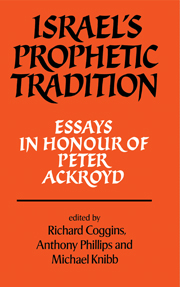Book contents
- Frontmatter
- Contents
- Preface
- Biographical note
- Abbreviations
- Note
- Prophecy in the ancient Near East
- The origins of prophecy in Israel
- Three classical prophets: Amos, Hosea and Micah
- The Isaiah tradition
- An alternative prophetic tradition?
- Visionary experience in Jeremiah
- The Ezekiel tradition: prophecy in a time of crisis
- The prophets of the restoration
- Prophecy and the emergence of the Jewish apocalypses
- Prophecy and wisdom
- Prophecy and the cult
- Prophecy and law
- A change of emphasis in the study of the prophets
- Martin Buber and the interpretation of the prophets
- Index of Biblical References
A change of emphasis in the study of the prophets
Published online by Cambridge University Press: 09 January 2010
- Frontmatter
- Contents
- Preface
- Biographical note
- Abbreviations
- Note
- Prophecy in the ancient Near East
- The origins of prophecy in Israel
- Three classical prophets: Amos, Hosea and Micah
- The Isaiah tradition
- An alternative prophetic tradition?
- Visionary experience in Jeremiah
- The Ezekiel tradition: prophecy in a time of crisis
- The prophets of the restoration
- Prophecy and the emergence of the Jewish apocalypses
- Prophecy and wisdom
- Prophecy and the cult
- Prophecy and law
- A change of emphasis in the study of the prophets
- Martin Buber and the interpretation of the prophets
- Index of Biblical References
Summary
Despite frequent appeals by linguistic pioneers and considerable publicity given to their contributions to Biblical criticism, there still remains a wide gap between those who employ their methods and insights and those who neither use them nor understand them, between readers of Semeia, one might say, and readers of Vetus Testamentum. One reason for this is undoubtedly the linguistic jargon: an understandable voodoo, like the one that used to prevent students faced with quaint massoretic terminology from learning Hebrew, now holds up progress towards a more enlightened approach to Biblical exegesis. Yet I believe one major contribution of twentieth-century linguistics is to be found, not so much in its terminology, important though that is, as in its perspectives and attitudes. It is to the elucidation and further development of some of these within Biblical studies, along paths already trodden by, among others, the recipient of this congratulatory volume, that the present contribution is dedicated.
If the sixties saw an increasing awareness among Old Testament scholars of the need for a more scientific approach to Semitic philology and lexicography, thanks to Barr's The Semantics of Biblical Language (1961), then the seventies have witnessed a new interest in stylistics and structuralism. Building on earlier studies in stylistics, notably Alonso-Schökel's Estudios de Poetica Hebrea (1963), Muilenburg launched a new approach to the study of the Old Testament, which he called ‘rhetorical criticism’, intended to take his subject beyond form-criticism, and many have found it a fruitful lead to follow (Muilenburg, 1969; cf. Jackson and Kessler, 1974; Kessler, 1980. See also Richter, 1971).
- Type
- Chapter
- Information
- Israel's Prophetic TraditionEssays in Honour of Peter R. Ackroyd, pp. 233 - 249Publisher: Cambridge University PressPrint publication year: 1982



